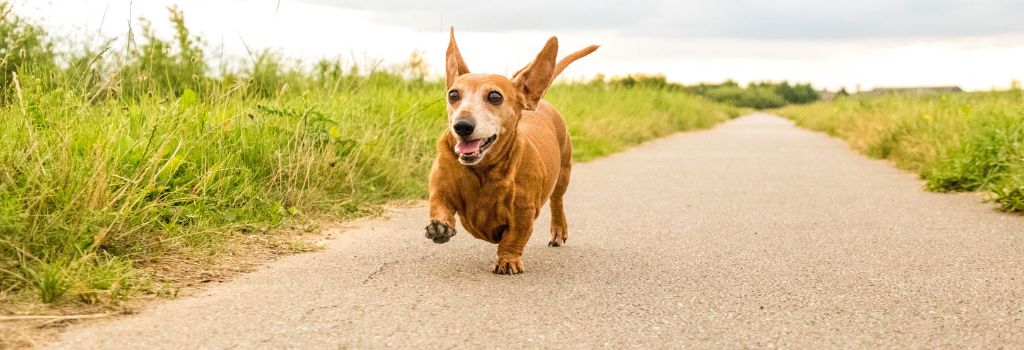
A dog that packs a lot of character into a compact frame, the Dachshund, affectionately known as the "Doxie," is a winner in our book. Also known as weiner dogs, Doxie's are low to the ground, but high on our list!
Why Choose a Dachshund?
Doxies are the epitome of 'small but mighty.' Don't let their diminutive size fool you; these dogs are energetic and playful, often displaying courage that belies their small stature. They're also vigilant watchdogs, quick to alert you with their sharp bark at the first sign of an intruder. This breed is steady, fearless, and bold.
Moreover, Dachshunds are extremely adaptable, making them well-suited for various living conditions, whether you reside in a small apartment or a sprawling estate. However, what truly sets them apart is their loyalty. A Dachshund is a devoted companion, always protective of their human family.
A Few Considerations
While Dachshunds are loveable, they come with their own unique quirks and needs. If you're someone who is away from home often, be aware that Doxies are prone to separation anxiety. They need socialization early on to accept other pets and strangers, and they love to dig—often when you least expect it!

Their strong-willed nature can make them a bit of a handful when it comes to obedience training. Also, when they get nervous or agitated, they can be snappy. A Doxie will thrive in an environment where they receive a lot of attention from her family.
Worth It?
Yes, you bet! If you're willing to put in the time for training and companionship, a Dachshund can be an extraordinarily loyal and entertaining friend for years!
A Walk Through History
Dachshunds were originally bred for the serious job of badger hunting in 1600s Germany. Their unique shape, long and low to the ground, was specially designed to fit into tight underground dens. The breed comes in two sizes: standard and miniature, and they sport three types of coats: smooth, wirehaired, and longhaired. Their fearless attitude makes them territorial and protective, but they absolutely thrive on close human companionship.
With an average lifespan of 12-15 years, a Dachshund can provide you with many years of friendship, loyalty, and love. If you're up for the challenge and the rewards, a Dachshund might just be the canine companion you've been looking for!

Genetic Predispositions for Dachshunds
Back Problems: The Weight of Love for Your Dachshund's Spine
Dachshunds are often prone to Intervertebral Disc Disease (IVDD), a condition where the cushiony disc between the vertebrae either slips or ruptures. When this happens, it puts pressure on their delicate spinal cord. If suddenly, your pup seems hesitant to jump, has a hunched back, or—even worse—shows signs of paralysis, it’s time to ring the vet ASAP. Quick intervention, sometimes including surgery, can make all the difference. And here’s a tip: Keep your dog’s weight in check and consider using pet ramps at home to save that spine!
Cushing’s Disease: When Hormones Go Haywire
Have you noticed your Doxie gulping down water, eating like there's no tomorrow, or maybe acting a bit lethargic? Don't just dismiss it as a "dog day afternoon." Dachshunds are more likely than other breeds to develop Hyperadrenocorticism, commonly known as cushing's disease. It’s all about an imbalance in the adrenal glands, causing them to pump out too much steroid hormone. Don't worry, treatment usually involves oral medications and regular check-ins with your vet for dosage adjustments.
Heart Matters: Love Them Heart and Soul
A Dachshund's golden years are a treasure but also the time when they're most at risk for Heart disease. The issue often lies in a weakening heart valve, which causes blood to backflow and strains their little hearts. Early symptoms may include a heart murmur. The good news? Early diagnosis and medication can prolong your dog's quality of life for years. Keep that smile on their face and wag in their tail by keeping up with regular vet visits!

Liver Issues: More than a Gut Feeling
Liver problems, especially a condition known as Portosystemic Shunt (PSS), are more prevalent in Dachshunds than other breeds. Symptoms could range from stunted growth to seizures. The treatment may include surgery, dietary changes, and medication. Before any surgery or anesthesia, a liver function test is a must for your Doxie. It's better to catch issues early on, so those tails can keep wagging!
Vision Quest: Keeping an Eye on Eye Problems
Dachshunds can inherit or develop a variety of eye conditions, some of which can lead to blindness if untreated. From glaucoma to cataracts and dry eyes, it’s important to monitor for signs such as squinting, redness, or a change in eye appearance. Remember, early detection can save your pup's sight and spare them from pain.
Sugar Overload: The Diabetes Dilemma
Like humans, Dachshunds can also get diabetes, which affects their ability to regulate sugar metabolism. Symptoms include an increase in eating, drinking, and urination, along with weight loss. It’s a manageable condition, but it does require daily insulin shots and regular monitoring.
Don’t Let the Bleeding Start
Our beloved Dachshunds can be at risk for inherited bleeding disorders like Von Willebrand's Disease. You might not even know your dog has a problem until an injury happens or they undergo surgery, and severe bleeding occurs. It’s crucial to get blood tests done before any surgical procedures to ensure they're as safe as possible.
The Uninvited Guest: Bladder or Kidney Stones
If you notice your Dachshund buddy straining to pee or find blood in his urine, this is a red flag for potential kidney or bladder stones. And it's not just an "Ouch!" situation; it's a rush-to-the-vet, medical emergency! Remember, early diagnosis is key, so let's include urine tests in our pup's regular check-up, shall we?
The Youngster's Dilemma: Juvenile Cellulitis
Ever seen those heart-wrenching pics of pups with swollen faces? Juvenile Cellulitis, also known as "Puppy Strangles," might be the culprit. Although rare, Dachshunds can be more prone to this condition. Thankfully, it responds incredibly well to antibiotics and steroid treatment when caught early. So if you've got a new Dachshund pup, stay vigilant!
The Trick Knee: Patellar Luxation
Knee problems like patellar luxation can make your Dachshund go from sprinting happily to hobbling in discomfort. You might see him skip or hop for a few strides and then kick his leg out to 'reset' his knee. Depending on the severity, treatment can range from arthritis medication to surgical intervention. Keep an eye out for any unusual leg movements, especially if your furry friend seems to be limping.
Age-Old Issues: Hip and Elbow Dysplasia
As our Dachshunds age, they're more prone to conditions like hip and elbow dysplasia. This can cause joint pain and stiffness, impacting their mobility and quality of life. An X-ray can help in early diagnosis, and the sooner it’s caught, the better it can be managed. Be extra cautious with overweight Dachshunds—they're likely to experience arthritis symptoms much earlier.
Young Dog Blues: Hip Necrosis
Also known as Legg-Calve-Perthes Disease, this condition commonly affects young Dachshunds. It’s thought to be linked to poor blood supply to the hip, causing a lot of pain and lameness. If your puppy is between six and nine months and shows these symptoms, it's time for a vet visit. Surgery is often the best course of action for this painful condition.

Seizure Alert: Epilepsy
Seizures are a serious concern and are unfortunately more common in Dachshunds than we'd like to admit. They can be categorized into reactive, secondary, and primary, with the latter often being an inherited condition. If your pup starts experiencing seizures, it’s crucial to consult a vet for diagnosis and ongoing medication.
The Sleepy Pup: Narcolepsy
Though it may sound cute, narcolepsy isn't just your Dachshund falling asleep mid-play. It's an uncontrollable sleep disorder that should be diagnosed as early as possible. But don't worry, your pup won't be driving anytime soon, so the risk is low! DNA tests are available for diagnosis.
Neurological Quirks
Certain neurological diseases can affect Dachshunds, showing symptoms like imbalance, tremors, and excessive sleeping. If you notice anything unusual, a quick vet visit is imperative for a proper diagnosis and treatment.
The Itchy and Scratchy Show: Mange and Skin Diseases
Demodex mites are common culprits of skin issues in Dachshunds. Early symptoms include dry, irritated, or hairless lesions. Similarly, seborrhea can cause both dry and oily skin, making your Dachshund uncomfortable and itchy. Both conditions can be managed with prompt veterinary care.
The Unwanted Guest: Cancer
Last but definitely not least, cancer is a serious concern, especially in older Dachshunds. The silver lining? Many forms of cancer can be surgically removed or treated with chemotherapy. So, always stay alert for any abnormal lumps or bumps.
If you have questions and you'd like to reach out to us, you can call us directly at (941) 253-5218, or you can email us at staff@uacvet.com. Don't forget to follow us on social media Facebook, Instagram.
